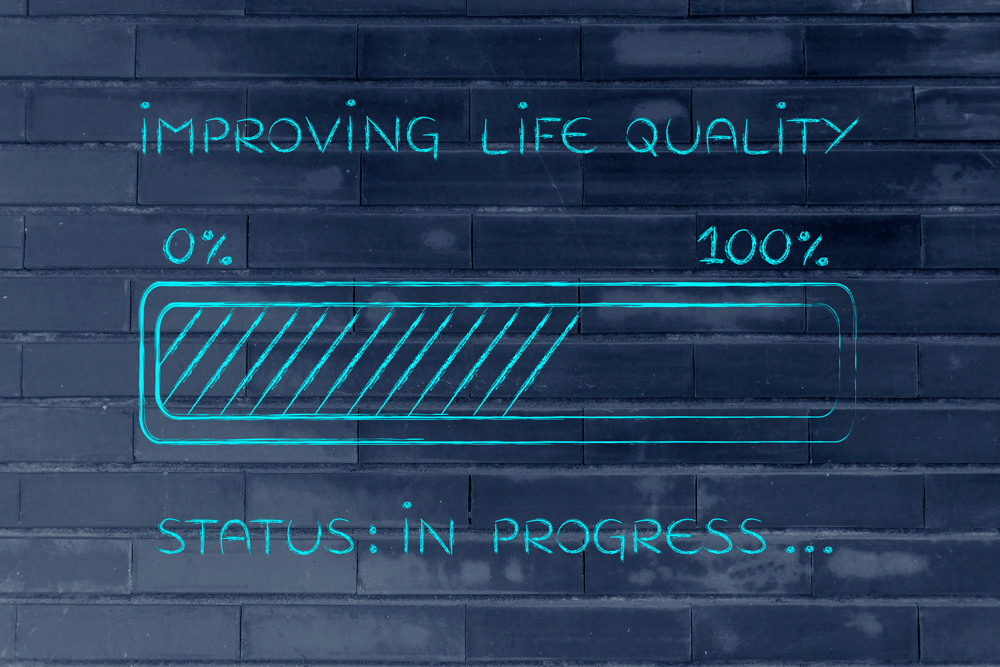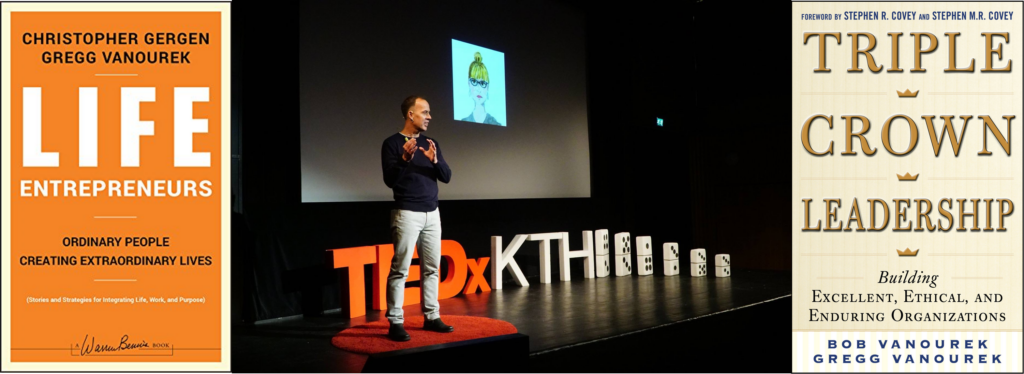When it comes to our health, we don’t think twice about going to the doctor for a check-up or for an annual physical.
In school, we take exams. At work, we have performance reviews.
In business, we have audits. In stores, we take inventory.
In sports, we do a post-game review. In the military, an after-action review. In medicine, a post-mortem.
So what do we do when it comes to the quality of our lives?
For most of us, nothing at all.
Huh?
What could matter more than the quality of our lives?
And yet we leave it unaddressed and unassessed.
Strange.
Thousands of years ago, Socrates wrote that “An unexamined life is not worth living.” And in the 19th century, Henry David Thoreau urged:
“Let us consider the way in which we spend our lives.”
Intuitively, we get this.
And yet.
Most of us spend way more time evaluating our projects and games than we do our lives.
Too busy for this? Think again.
How can we know whether we’re on track? How can we expect to make needed changes if we don’t first take the time to identify our pain points?
“The busier you are, the more intentional you must be.”
-Michael Hyatt
Enter the quality of life assessment.
Quality of Life Assessment
My Quality of Life Assessment is short and simple, and it focuses on ten important areas of our lives:
- Personal Core
- Health
- Spouse or Partner* (if applicable)
- Family
- Friends
- Education
- Work* (if applicable)
- Service
- Activities
- Financial
* Note that work can include parenting, household management, family caregiving, and/or volunteering.
“Every day we have decisions to make about how we want to live….
We must take charge of how we spend our days….
Otherwise, we may one day wake up to find ourselves brilliantly situated for a life we do not want.”
-Christopher Gergen and Gregg Vanourek in LIFE Entrepreneurs: Ordinary People Creating Extraordinary Lives
Four Keys to the Quality of Life Assessment
There are four keys to taking the Quality of Life Assessment:
1. Be honest with yourself.
With ten areas of life assessed, there will always be tradeoffs. The point is not to expect high scores in all areas at all times. Our lives have natural ups and downs. If we don’t like some scores, it’s not a time to beat ourselves up. (We do enough of that already.) The good news is that, with clarity about pain points, we’ve now brought them into our awareness (versus ignoring them or pretending they’ll magically go away). We should give ourselves grace even while committing to taking action.
“If you want to be successful, you must respect one rule: never lie to yourself.”
-Paulo Coelho, Brazilian novelist
2. Place it in perspective.
With our full schedules, we may be tempted to crank out the assessment and then focus only on the lowest scores and attack those areas. That’s a fine start, but it risks losing sight of the larger story. First, there may be things to celebrate in the results—either because the scores are high or because they’ve improved. Even some middling scores are worthy of celebration if they’re hard-earned or if the circumstances are challenging. We should remember to be grateful for what we do have and proud of what we have accomplished even as we look to improve. With our negativity bias and propensity for negative self-talk and rumination, we shouldn’t turn this into an exercise in cruel self-judgment. (Self-compassion works much better.)
As we look at both the scores and the overall picture, we should view it in the context of the current chapter of our lives, what we want, and what’s required of us—and then choose one or two areas to work on at a time so we don’t get overwhelmed. (Too often, we take on too much, only adding to our anxiety and setting us up for problems.)
3. Share and discuss our assessment with others.
The assessment and its attendant reflection process can be a solo activity but it’s so much richer when shared with others. We may feel a bit vulnerable about revealing our scores to others, but there’s an opportunity for real connection in the sharing process—not to mention new ideas, inspiration, support, and/or accountability from our collaborators. Discussing the assessment can be a great thing to do with our spouse or partner, children, and/or friends or colleagues—or in a small group. (The online tool comes with email forwarding functionality, so you can send it to others directly.)
4. Revisit it periodically.
This process is most valuable when it’s done periodically. Different people will prefer a different frequency. For some, it can be monthly or quarterly; for others, semi-annually or annually. There’s of course no right answer, except that it comes down to personal preference—and that the key is doing it consistently. (The online tool comes with a reminder option: we can set it up to remind us to consider taking the assessment again in the future.)
For the review process, we can also go further and set goals for each area—or only for the one or two improvement areas that we want to work on. We can also calendarize activities in each area—or, again, only in the improvement areas that we want to work on—so that actions arising from the review show up in our schedule. That way, we’ll keep this process front-and-center in our lives.
The point, of course, is not to take the assessment and be done with it. Rather, it’s to take the assessment (on a regular cadence), discuss it with trusted friends and colleagues who have our best interests at heart, and then decide what changes we want to make and get on with making them happen. It’s not rocket science, but it does require insight, motivation, commitment, and action.
Conclusion
We’ve seen the value of assessments in so many different areas—from health and work to sports and finances—so why not extend the practice to our lives? It’s possible that, with just a short amount of time and thought, we can identify the areas that are going well (and celebrate them) as well as note the areas that need work. Our future selves are likely to thank us for it.
“Life goes by so very fast, my dears, and taking the time to reflect, even once a year, slows things down.
We zoom past so many seconds, minutes, hours, killing them with the frantic way we live
that it’s important we take at least this one collective sigh and stop,
take stock, and acknowledge our place in time before diving back into the melee.”
-Hillary DePiano, New Year’s Thieve
Reflection Questions
- Have you checked in about your quality of life recently?
- What’s stopping you from taking a quick snapshot?
Wishing you well with this review process. Let me know if I can help.
–Gregg
Tools for You
- Quality of Life Assessment so you can discover your strongest areas and the areas that need work, then act accordingly.
- Traps Test (Common Traps of Living) to help you identify what’s getting in the way of your happiness and quality of life
- Crafting Your Life & Work online course to help you design your next chapter and create a life you love.
Related Articles
- “Elevate Your Life with a Strong Personal Core”
- “Health and Vitality: Keys to Your Quality of Life”
- “Are Your Drifting through Life?”
- “Tired of Settling? How to Set Your Life and Work on Fire”
- “Are You Playing the Long Game?”
- “The Problem with Lacking Clarity in Your Life”
- “The Complacency Trap”
- “The Problem of Going It Alone”
- “Are You Feeling Empty Inside?”
- “Do You Have Margin in Your Life?”
- “How Inertia Keeps Us from Making Needed Changes in Our Life and Work”
- “Do You Have Limiting Beliefs About Yourself?”
- “The Power of Taking Full Responsibility for Your Life”
- “A Quick Relationship Checkup”
- “A Quick Family Relationship Checkup”
- “Check in on Your Friendships: A Quick Checkup”
- “Unlock the Magic of Lifelong Learning”
- “Rating Your Job: A Work Satisfaction Checkup”
- “Are You Serving Enough Every Day?”
- “A Guide to Life-Boosting Activities”
- “How to Improve Your Financial Health”
- “How to Use Anticipation to Boost Your Happiness”
Postscript: Inspirations on the Importance of Taking Stock
- “How will you measure your life?” -Clayton Christensen
- “It is remarkable how easily and insensibly we fall into a particular route, and make a beaten track for ourselves.” -Henry David Thoreau
- “Being too busy, which can seem necessary and unavoidable, can become a habit so entrenched that it leads you to postpone or cut short what really matters to you, making you a slave to a lifestyle you don’t like but can’t escape. You can be so busy that you don’t even take the time to decide what actually does matter most to you, let alone make the time to do it.” -Dr. Edward Hallowell in Crazy Busy
- “Think about the metric by which your life will be judged, and make a resolution to live every day so that in the end, your life will be judged a success.” -Clayton Christensen
“It is all too easy to speed through life with our eyes focused only on the road ahead.
The challenge is scanning the horizon from time to time to determine where we are headed.
To stay on track, we need to take regular stock of our decisions and actions.
Reflection keeps us focused on the right priorities and accountable to our vision and goals.
To hold ourselves accountable, we should adopt a regular routine of checking progress against our goals,
ensuring that our actions reflect our priorities…. It helps to set regular check-in times.”
-Christopher Gergen and Gregg Vanourek, LIFE Entrepreneurs: Ordinary People Creating Extraordinary Lives
Note: For aggregate data on how people rate their lives, see Gallup’s Life Evaluation Index.
++++++++++++++++++++++++++++++
Gregg Vanourek is a writer, teacher, and TEDx speaker on personal development and leadership. He is co-author of three books, including LIFE Entrepreneurs: Ordinary People Creating Extraordinary Lives (a manifesto for living with purpose and passion) and Triple Crown Leadership: Building Excellent, Ethical, and Enduring Organizations (a winner of the International Book Awards). Check out his Crafting Your Life & Work online course or get his monthly newsletter. If you found value in this article, please forward it to a friend. Every little bit helps!




